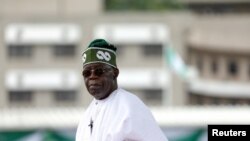Former Lagos governor Tinubu won the Feb. 25 vote in a highly contested ballot that the main opposition Peoples Democratic Party (PDP) and Labour Party claim was marred by fraud and irregularities.
An Abuja petition court of five judges will rule on Wednesday whether the opposition claims are valid in proceedings broadcast live on television, the court administration said in a statement on Monday.
Whatever the outcome, it is not the final step, with the losing parties likely to take the decision to the Supreme Court for a further challenge, according to legal experts.
Tinubu took office in May and has already introduced a major set of reforms aimed at reviving Africa's largest economy and attracting more investors.
The president traveled on Monday to participate in the G20 summit in India, where he will be seeking more foreign investment in Africa's most populous nation.
Nigeria's elections have often been marred by violence and fraud claims and mostly end up in court. But February's ballot was one of the most tightly contested races since the country's 1999 return from military rule.
For the first time, a major third party candidate, Labour's Peter Obi, challenged the traditional dominance of the ruling All Progressives Congress and the PDP, who have shared power since Nigeria's return to democracy.
The Independent National Electoral Commission, or INEC, had introduced new technology aimed at improving transparency by uploading results in real time.
But both PDP and Labour challenged the results, claiming various irregularities, including INEC's failure to follow electoral law, fraud, vote rigging and allegations Tinubu did not meet constitutional requirements.
INEC recognized technical "glitches" but dismissed claims the vote was not free and fair.
Tinubu's government came to power with Nigeria facing huge economic challenges, rising poverty and a myriad of security problems, from jihadists to intercommunal clashes and kidnap gangs.








Forum